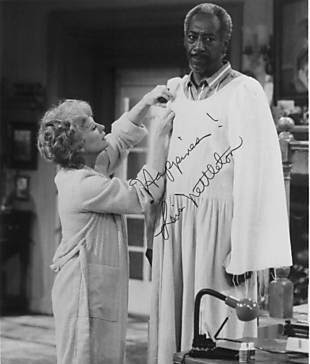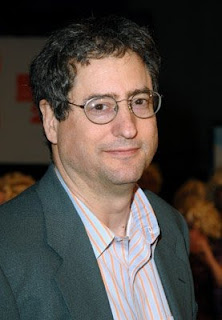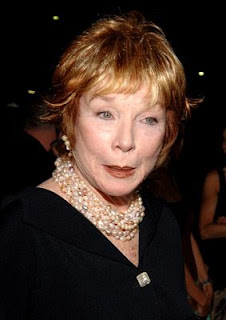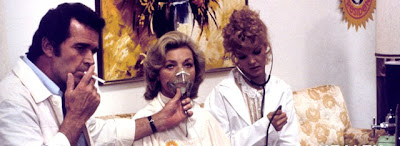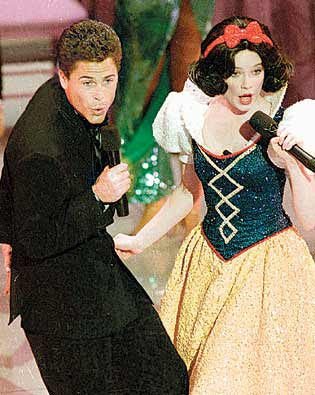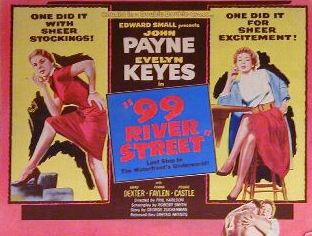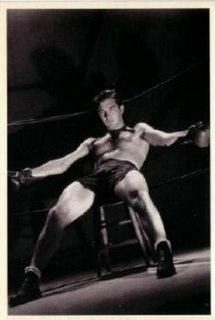

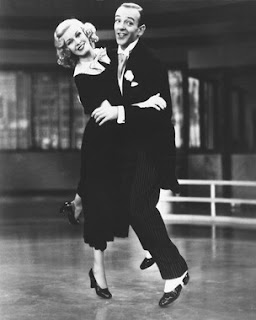
Even the most educated filmgoer tends to underrate the multitalented Ginger Rogers, pretty much assuming that she and Fred Astaire were joined at their hips and remained, throughout their repective careers, irrevocably intertwined. Not to diminish Fred's invaluable contribution to film, but Ginger had a much more full-bodied career, excelling in just about every area. And Turner will present 43 of her vehicles throughout the month to demonstrate exactly how she conquered film, critics and fans. Dare I say it? OK, I will: Ginger Rogers was better than Katharine Hepburn and Bette Davis combined, and she soared through hard, diligent work, not shameless self-promotion. She's Turner's Star of the Month, deservedly so.
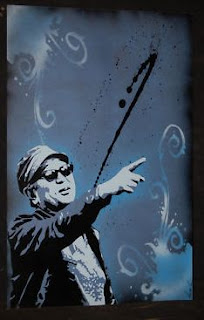
The influential Japanese filmmaker Akira Kurosawa also gets the spotlight with a 26-film tribute that culminates in a 24-hour marathon on 23 March, which would have been the centennial of his birth. But first there's Jessica Lange, showcased in her double-Oscar-nominated roles from 1982 - Graeme Clifford's "Frances" in which she plays the troubled Frances Farmer, and Sidney Pollack's "Tootsie" in which flirts with a woman played by Dustin Hoffman. They air back-to-back, starting at midnight, on 2 January.
Muscular men doing pirouettes in the strangest settings is what we get from another double-bill later that day, Stanley Donen's "Seven Brides for Seven Brothers" (1954) and Robert Wise and Jerome Robbins' "West Side Story" (1961), beginning at 6 p.m. Another musical, Fred Zinnemann's "Oklahoma!" (1955), airing at 3:30 p.m. on 3 March, is notable also for the manly dancing of Gene Nelson but also for the bracing, offbeat casting of Method actor Rod Steiger and Noir vamp Gloria Graham.
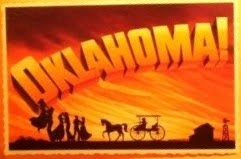
Michael Cimino's superb "Heaven's Gate" (1981), a victim of the lynch-mob mentality indulged in by studio people and complicit critics in its day, is definitely worth a second look at 12:15 a.m. on 4 March. And if you are as fond of Luana Anders as I am, you'll want to stay up (or get up early) on 5 March for the 4 a.m. screening of Francis Ford Coppola's "Dementia 13" (1963). At a more reasonable hour that day, Joseph Losey's fascinating "The Boy with Green Hair" (1948) will be presented at 11 a.m. as part of a Dean Stockwell marathon.
Joseph Pevney's "The Crowded Sky" (1960), airing at 8 p.m. on 5 March, is the cinematic equivalent of comfort food, what with such soothing presences as Dana Andrews, Efrem Zimmbalist, Jr., Anne Francis, Rhonda Fleming and Patsy Kelly among its sprawling cast, most of them Warners contract players at the time. Meanwhile, George Cukor's brainy brand of escapism is in full bloom and full force in the delightful "Heller in Pink Tights" (1960), in which Sophia Loren, Anthony Quinn and Eileen Heckart, among others, play a traveling band of performers hitting every whistle stop in the old west. See it at noon on 6 March.


Turner wittily goes head-to-head with the Oscarcast on 7 March by airing Russell Rouse's turgid "The Oscar" (1966) with Stephen Boyd defining what it means to be an unscrupulous, narcissistic actor. It screens at 8 p.m. and will be followed by Robert Aldrich's "The Big Knife" (1955), King Vidor's "Show People" (1928), Jean-Luc Godard's "Contempt" (1963), with Brigitte Bardot (in poster above) and Michel Piccoli (in tub) and Vincente Minnelli's "The Bad and the Beautiful" (1952)
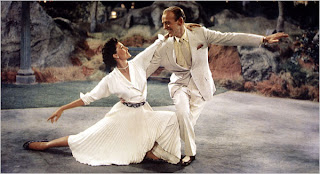
There's more Minnelli on 8 March as part of a Cyd Charisse tribute, starting at 8:15 p.m. with "The Bandwagon" (1953), which is followed immediately by "Brigadoon" (1954) and later, at 6 p.m., by "Two Weeks in Another Town" (1962), the companion film of the aforementioned "The Bad and the Beautiful."

Part of the success of Richard Quine's delightful film musical of "My Sister Eileen" (1955), screening at 2 p.m. on 9 March, is that Quine gave full reign to Bob Fosse (billed here as Robert) as choreographer. Fosse, who also co-stars in the film (in the role thaat Quine himself played in the straight Rosalind Russell version), displays early versions of his signature moves in "Give Me a Band and My Baby" (music by Jule Styne, lyric by Leo Robin) and especially in his dancing duet with Tommy Rall, "The Competition," another example of rugged, masculine dancing. That's title star Janet Leigh above with Kurt Kasznar, Dick York and Betty Garrett.
Speaking of dancing, Turner has schedule a bunch of Rogers-Astaire classics on 10 March, preceded at 6 p.m. by the Danny Kaye/Michael Kidd collaboration, "Merry Andrew" (1958). Kaye always seemed to be dancing even when he wasn't. BTW, the Rogers-Astaire dancethon continues into 11 March. Of special note on 11 March is Turner's 6:30 p.m. screening of Herman Hoffman's excellent but rarely-seen "It's Dog's Life" (1955), ahead of its time in its depiction of brutal dog-fighting. Look for handsome Jeff Richards in an against-type villain role and character actors Dean Jagger and Edmund Gwenn in the leads. Of course, bull terrier Wildfire as the titular pooch is extraordinary. Really. Elmer Bernstein did the score.
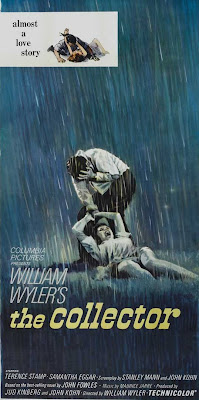
William Wyler's haunting "The Collector" (1965), highlighted by Maurice Jarre's beautiful harpsichord-driven score, is the apt centerpiece of a day dedicated to Samantha Eggar, who was pretty much the Nicole Kidman of her day. The Wyler film, which co-stars an expert Terrence Stamp in the title role, airs at noon, preceded by Alexander Singer's "Psyche 59" (1964), starring Patricia Neal and Curt Jurgens, and followed by J. Lee Thompson's difficult-to-see "Return from the Ashes" (1965), with Maximilian Schell and Ingrid Thulin; Charles Walters' "Walk, Don't Run" (1966), with Cary Grant and Jim Hutton, and Eric Till's "The Walking Stick" (1970), with David Hemmings and Emlyn Williams.
The curious team of mime Marcel Marceau and schlockmeister William Castle give us "Shanks" (1974), a film in which Marceau gets to utter exactly one word. It airs at 2:30 a.m. on 13 March and is followed by Castle's "Mr. Sardonicus" (1961), with the inimitable Oskar Homolka, Audrey Dalton (from "The Joey Bishop Show"!) and Ronald Lewis as a guy with a frozen face.
Henry Levin's "Where the Boys Are" (1960) remains one of the most peculiar "youth pics" of all time - a romp whose pivotal scene is a gang rape. People actually walked out of the theater smiling and humming the title song. Go figure. Witness it at 6 p.m. on 14 March.

The estimable John Sturges directs James Garner, Jason Robards, Jr. and Robert Ryan in his solid Wyatt Earp/Doc Holliday tale, "Hour of the Gun" (1967), at 12:15 a.m. on 19 March. Robards was married to Lauren Bacall at the time; Garner would date Bacall many years later when they starred in "The Fan" and "H.E.A.L.T.H."
"Kitten with a Whip" (1964), the definitive Ann-Margret flick (
not a compliment) is also on the schedule. You can catch it at 2 a.m. on 20 March. John Forsythe and Peter Brown, who were pretty much the same person (only at different ages), co-star. Someone named Douglas Heyes directed. The year before, A-M played a blushing teen in "Bye, Bye Birdie."


David Lean's
"Lawrence of Arabia" (1962), the thinking-man's epic, takes over the night of 20 March, starting at 8 p.m. Another Peter O'Toole keeper, Peter Medak's "The Ruling Class" (1972), in which O'T. plays deranged as no one else can, follows at midnight.

Sam Peckinpah serves up family values of the best sort in his wonderful rodeo drama, "Junior Bonner" (1972), starring Steve McQueen in what I think of as his defining role. (He and Peck made "The Getaway" the same year - what a year!) This time, though, keep your eyes on Ida Lupino and Robert Preston (that's them above) who play McQueen's estranged parents who are still mightily attracted to one another. "Junior Bonner" airs at 5:45 p.m. on 24 March, right after several other McQueen titles, among them Mark Rydell's "The Reivers" (1969).

One of two seemingly lost Jean Simmons movies unexpectedly pops up when Turner airs Richard Brooks' burning "The Happy Ending" (1969), the edgy story of an unhappy woman trapped in a deadend marriage that has gone on too long. Don't miss it at 2 a.m. on 26 March. That's Jean Simmons (above, left) with co-stars Shirley Jones and Robert Darin (as he was billed in the film). The other lost Simmons' title? Why, Mervyn LeRoy's
"Home Before Dark" (1958), of course.

Jack Starrett's wickedly witty thriller, "Race with the Devil" (1975), is my favorite allegorical/cautionary vacation film. In it, Peter Fonda and Warren Oates and their respective wives, Lara Parker and Loretta Switt, are on a blissful holiday when they meet up with ... Satanists, lead by R.G. Armstrong, no less. It screens at 2:15 a.m. on 27 March. Phil Karlson tries his hand at the young doctors genre with a film titled ... "The Young Doctors" (1961), airing at 6:15 p.m. on29 March. Karlson has an ace cast - Frederic March, Ben Gazarra (with the fabulous character actor, Edward Andrews, below) and, yes, Dick Clark. Meanwhile, at 4:30 a.m. on 31 March, you can catch Peter Brook's definitive "King Lear" starring Paul Scofield.


The month winds down with a day devoted to Shirley Jones, arugably Hollywood's last musical-comedy ingenué. Starting at 8:15 a.m. on 31 March, the Jones list includes the cut version of George Sidney's all-star Pepe" (1960), John Ford's "Two Rode Together" (1951), with James Stewart and Richard Widmark; Vincente Minnelli's "The Courtship of Eddie's Father" (1963), with Glenn Ford and Ron Howard (Jones' kid brother from Morton DaCosta's "The Music Man"); Sidney's "A Ticklish Affair" (1963) with Gig Young (with Shirley in above photo); the George Marshall-Vittorio Sala curiosity, "Dark Purpose" (1964) with Rossano Brazzi and George Sanders, and Andrew L. Stone's "The Secret of My Success" (1965) which teams Jones with her "Eddie's Father" co-star, Stella Stevens. Enjoy!



